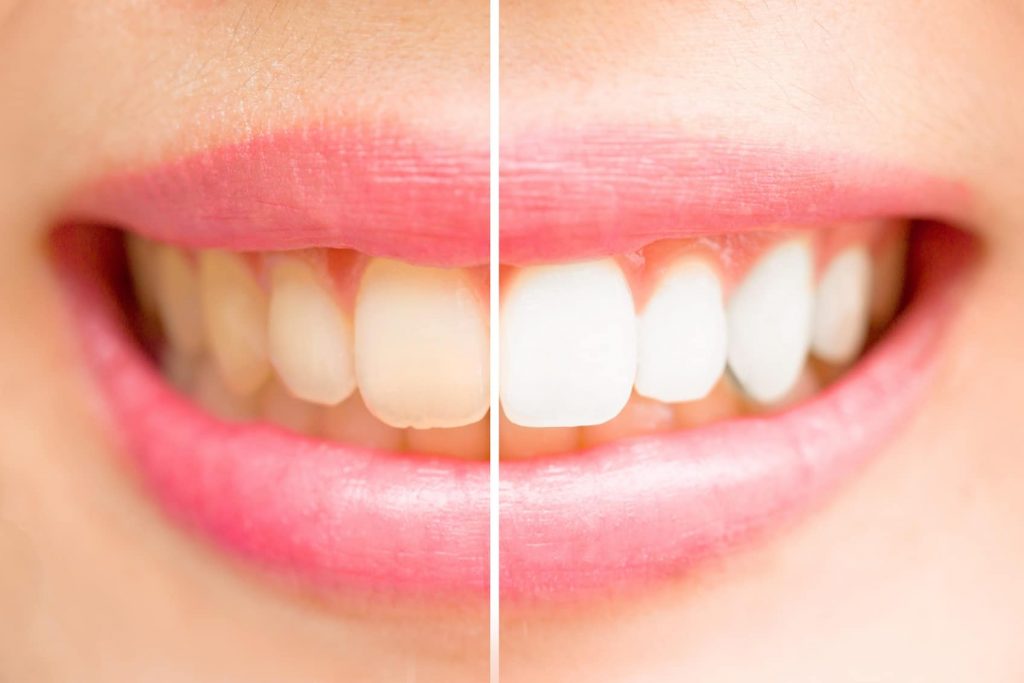Teeth Whitening
Since your mouth is one of the first things that others notice about you, it’s no wonder that you desire for your mouth to be as healthy and attractive as possible. There are many things that can affect your oral health, comfort and appearance, not the least of which is stained or discolored teeth.
When your teeth become stained or discolored, you may find that you are very self-conscious about this condition and desire to correct it as quickly and thoroughly as possible. This is where teeth whitening comes in.

Why Teeth Become Stained or Discolored
The outer, protective layer of your teeth is called the enamel. It is the reflection of light off the enamel, as well as the color of the dentin underneath the enamel, that affects the color of one’s teeth. An individual’s genes can affect the thickness and smoothness of their tooth enamel, which can then affect the natural color of their teeth. Thinner enamel will of course better show the color of the dentin underneath.
Tooth enamel is porous and therefore can hold stains, especially if one participates in tooth-staining habits such as tobacco use, or coffee, cola, tea and red wine consumption, and if they fail to properly care for their teeth. Age can also thin tooth enamel and cause dentin to become darker. Additionally, a thin coating called pellicle forms on the tooth enamel each and every day, and this too can pick up stains. All of these stains are considered extrinsic, or surface stains, and are the ones most benefitted by teeth whitening procedures. It is also possible to develop intrinsic stains within the tooth, which can be caused by excessive exposure to fluoride while teeth are still developing in childhood or by tetracycline antibiotic use during pregnancy or in young children.
Professional Teeth Whitening
There are many over-the-counter teeth whitening products, but these may not be as effective as professional teeth whitening procedures. Furthermore, it is always best to speak with your dentist prior to undertaking any teeth whitening, as they will want to ensure that any cavities are treated prior to the whitening process so that the solution cannot pass into the inner parts of the tooth. They may advise you that using teeth whitening products while suffering from receding gums can cause you to experience heightened tooth sensitivity. They will also prepare you for the fact that teeth whitening products cannot work to improve the appearance of ceramic or porcelain crowns and veneers.
If you have decided to receive professional teeth whitening, your dentist will:
- Examine your teeth and ask you about various habits that may have contributed to the staining or discoloration.
- Photograph your teeth in order to monitor the whitening process.
- Thoroughly clean your teeth in order to remove all bacteria, food and other substances that build up on your teeth and contribute to the staining.
- Take dental impressions to make whitening trays for use at home, or if you are receiving in-office treatment, place whitening gel on your teeth for the treatment.
The most common teeth whitening treatment is vital whitening, which is performed on teeth that have live nerves. In vital whitening, a gel containing some form of hydrogen peroxide is placed on the surface of the teeth. Where teeth no longer have live nerves, as in cases where root canals have been performed, non-vital whitening is performed. In non-vital whitening, the dentist places a whitening agent inside the tooth and covers it with a temporary filling for several days. If needed, this process can be repeated until the tooth achieves the desired level of whiteness.
Teeth whitening, and even professional teeth whitening, is not a one-time process, but rather one that an individual needs to repeat every so often in order to continue experiencing the desired results. Of course, the benefits of teeth whitening can be extended if one abstains from those habits that contribute to staining and discoloration.
For more information about teeth whitening or to schedule your teeth whitening treatment, contact Dr. Nurminsky today.
